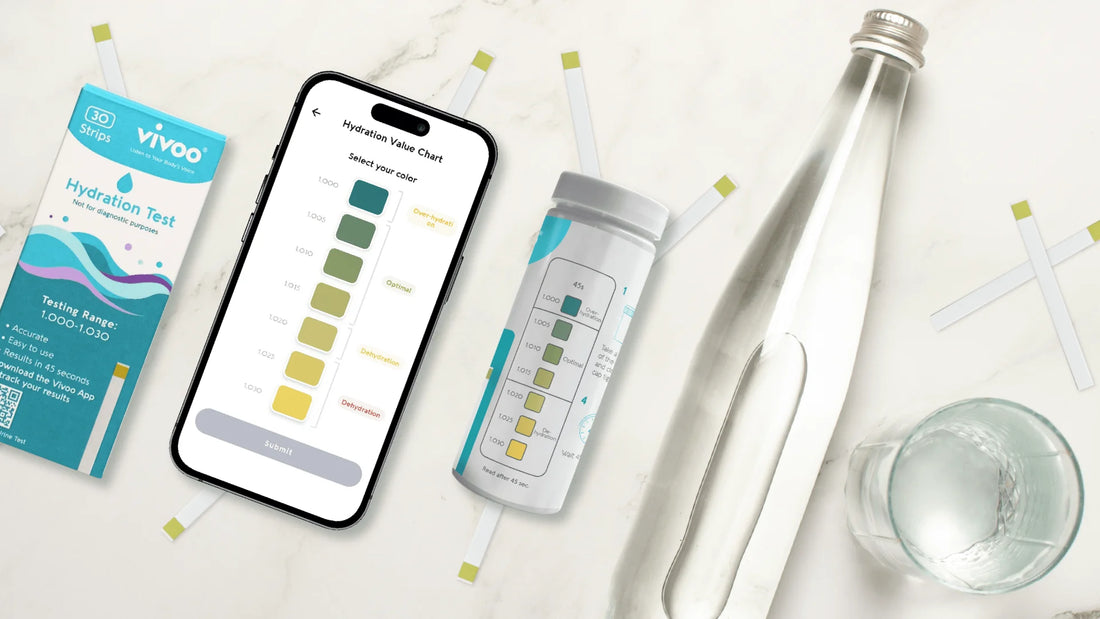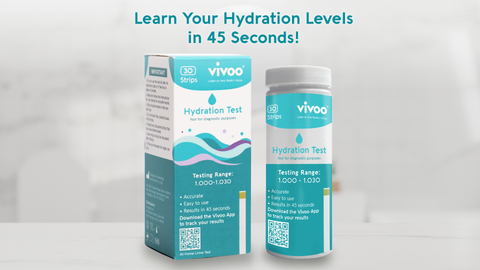Vivoo Water Box
Staying adequately hydrated by drinking fluids is vital for wellness. It keeps every part of the body functioning efficiently.
Your body fluid balance, or “hydration status”, refers to the difference between fluid intake and loss. The kidneys help regulate the body’s fluid balance by controlling urine output: the more fluids you take in, the more urine the kidneys will produce, and vice versa.
Dehydration or a deficiency of water in the body occurs when your body loses more fluids than you consume. Overhydration, or an excess of water in the body, on the other hand, occurs when you take in more water than the body can excrete [1].
Water is essential for life. Every cell, tissue, and organ in the body needs water to work properly. It plays a role in the digestion, absorption, and transportation of nutrients to our cells, and in the formation of biochemical reactions necessary for life and wellness.
Staying hydrated helps:
- Regulate body temperature
- Cleanse the body
- Enhance cognitive function
- Maximize physical performance
- Improve digestion and absorption of nutrients [5] [6] [7]
What is a Specific Gravity Urine Test?
The urine-specific gravity test compares the density of urine with the density of water. Because of this, your urine-specific gravity value offers valuable insights into your hydration status.
What Does Specific Gravity Mean in a Urine Test?
Specific gravity in a urine test tells us how concentrated or diluted the urine is compared to water. It helps check if you're hydrated enough and how well your kidneys are functioning.
When you take the Vivoo test, it is expected that the specific gravity of your urine is between 1.005 and 1.015 at an optimal level. Higher numbers indicate dehydration, while lower numbers indicate excessive water intake or a recent loss of fluids in the short term.
How to Use Vivoo to Check Specific Gravity?
Vivoo offers a straightforward and fuss-free method for determining whether you are sufficiently hydrated. With a simple test, you can learn your hydration status in real-time, and get personalized tips on how you can stay hydrated. This is especially useful if you juggle a packed schedule, and often forget to drink throughout the day. Vivoo’s Water box is designed to assess the user’s hydration status and provide personalized insights accordingly.
In addition to determining your hydration level, Vivoo also provides suggestions on:
- How much water your body needs daily
- How to reach an optimal state of hydration
- What you can do to stay hydrated
- How to maintain your body’s electrolyte balance
How to Evaluate Possible Results?
Here’s how you can interpret Vivoo strip test results on your specific gravity levels:
- Score:6/10, 5/10, 2/10
- Label: Dehydration
- Value: 1.020, 1.025, 1.030 Specific Gravity
About 65% of the human body is made up of water, and it loses an average of 2.5-3 liters of fluids daily. Dehydration occurs when the fluids you lose are not adequately replenished [2].
- Score:10/10
- Label: Optimal
- Value: 1.005, 1.010, 1.015 Specific Gravity
Staying well-hydrated keeps the body’s fluid and electrolyte levels in balance and ensures wellness. For instance, drinking enough water is crucial for temperature regulation. At its core, hydration is key for becoming the best version of yourself [3].
- Score:07/10
- Label: Overhydration
- Value: Below 1.005 Specific Gravity
Drinking too much water can lead to overhydration, which in turn can cause water intoxication. This occurs when the amount of sodium and other electrolytes in the body becomes too diluted [4].
When Should You Test Your Specific Gravity Levels?
You should test specific gravity levels in urine:
- Regular Monitoring for Hydration Status: Routinely checking your specific gravity levels can help you understand how much water you're consuming daily and whether your body is maintaining its water balance.
- Before and After Exercise: Testing your specific gravity levels before and after exercise can help you understand the balance of your body fluids. Observing fluid loss through sweating during exercise and changes in your body can be important.
- During Illness or Changing Conditions: Particularly during illness or changing conditions, there can be sudden shifts in fluid levels in the body. Checking specific gravity levels regularly during such times might be beneficial.
- In Hot Weather or High Altitude Conditions: In hot weather or at high altitudes, the body might lose more water. Monitoring specific gravity levels can help ensure you're adequately hydrated in these conditions.









